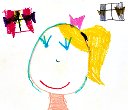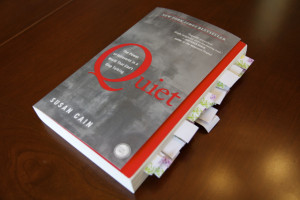Me, Myself, and Us: The Science of Personality and the Art of Well-Being
By Brian R. Little, 2014
 All of you Susan Cain fans (which is hopefully all of you!) probably remember the story in Quiet about Brian Little, the introverted psychology professor who hides out in the bathroom after he gives a big presentation.
All of you Susan Cain fans (which is hopefully all of you!) probably remember the story in Quiet about Brian Little, the introverted psychology professor who hides out in the bathroom after he gives a big presentation.
That story also appears in Me, Myself and Us, Little’s own book about personality, but he goes beyond talking about introverts and extroverts. He explores other personality traits and argues that it’s common to act out of character, especially if it’s in service of a project that’s important to you. The bad news is, that can come at a cost. But Little argues that, by carving out a “restorative niche” for yourself (see: bathroom hideout), you can help lessen the impacts.
As I said in my post about my goals for the year, parenting is of course one my personal projects, one where I’m willing to go out of my introvert comfort zone again and again. Here on the blog we’ve talked a lot about ways to balance out all the extroverting that goes along with being a parent.
But it was the other personality scales Little discussed that made this book most interesting for me. I ended up wishing I’d taken more psychology classes in college, because this is such cool stuff. The other scales and ranges included things like conscientiousness, agreeableness, neuroticism, and openness (along with extroversion, these make up the so-called Big Five personality traits). Little also discusses self-monitoring, or how much you change your actions based on the situation you’re in; how much control you feel you have over your life; stress and resilience; creativity; and even how well your personality is matched to the personality of the place you live.
I was really intrigued by the idea that I might want to look at strategies to counterbalance acting out of character in some of these other arenas, too. I think we do this instinctively in some sense – I score pretty low on openness to new experiences, so if I have a day involving a new volunteer task at Doodlebug’s school followed by driving her to an appointment at a new doctor’s office, by dinnertime I know I’m not going to feel like tackling a recipe I’ve never made before. I’m probably going to want grilled cheese and soup, and that’s okay. In fact, Little seems to be saying I might want to plan an evening re-reading a favorite book, too. Works for me.
Little’s discussion of control reminded me that I’m someone who likes to think I can figure anything out if I try hard enough. Parenting, of course, is not something you can simply master and be done with – kids are always changing, and the strategy that worked great a week ago may be totally useless today. I’m not sure what a restorative niche might look like here – solving crossword puzzles or math problems or something else concrete? I’ll have to keep thinking about that one.
Ultimately, Me, Myself, and Us made me believe even more strongly that I need to carefully choose which projects I want to take on, so I don’t devote too many precious resources to things I don’t care about that much. I’ve always thought that was a good policy for introverts, so it was interesting to see it reinforced from an entirely different direction. Recommended!
— Kathy
Bonus materials: Dr. Little’s web site has more information about his theories and includes a downloadable tool to evaluate and assess your own personal projects.


